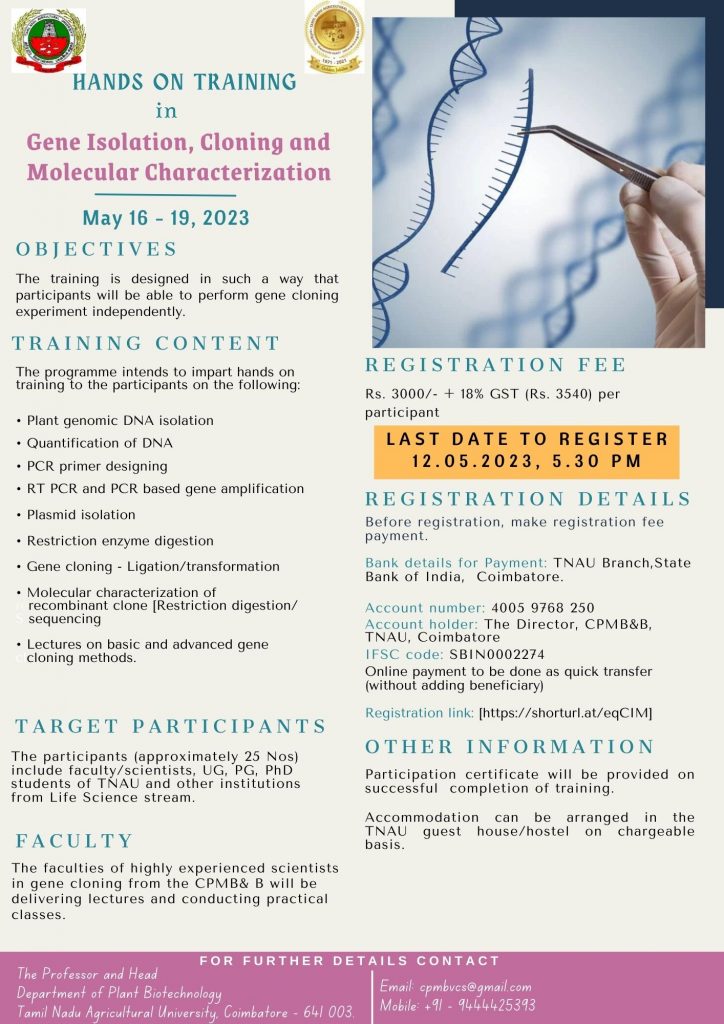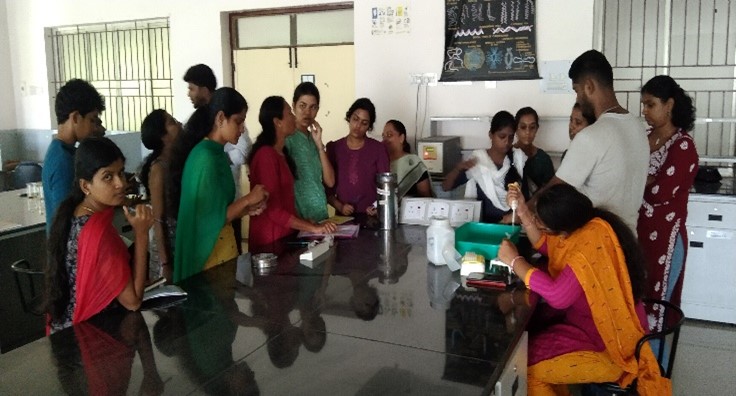Objectives
The training is designed in such a way that participants will be able to perform gene cloning experiment independently.
Training Content
The Programme intends to impart hands on training to the participants on the following:
- Plant genomic DNA isolation
- Quantification of DNA
- PCR primer designing
- RT PCR and PCR based gene amplification
- Plasmid isolation
- Restriction enzyme digestion
- Gene cloning – Ligation/transformation
- Molecular characterization of recombinant clone [Restriction digestion/ sequencing]
- Lectures on basic and advanced gene cloning methods.
The Department of Plant Biotechnology, Centre for Plant Molecular Biology and Biotechnology organized a four-day “Hands on Training in Gene Isolation, Cloning, and Molecular Characterization” from May 16–19, 2023, at CPMB&B, TNAU, Coimbatore, under the Venture Capital (V60 KE) scheme. Fourteen participants from different states of India attended the training programme. The Hands-on Training in Gene Isolation, Cloning, and Molecular Characterization was inaugurated on May 16, 2023, and was presided over by Dr. M. Raveendran, Director of Research. A welcome address and briefing about the training programme were given by Dr. E. Kokiladevi, Professor and Head, Dept. of Plant Biotechnology. Dr. M. Raveendran, Director of Research, gave a special address. He emphasized the importance of skill development in different frontier areas for the progress of the country. This was followed by the self-introduction of participants. A formal vote of thanks was proposed by Dr. K.K. Kumar, Professor (Biotech).
Day one of the training started with a lecture by Dr. D. Sudhakar, Professor (Biotech), He explained the basic principles of gene cloning, the tools used in gene cloning, and the types of vectors used in gene cloning. This was followed by a practical session on the isolation of plant genomic DNA from rice. Then in the afternoon, primer designing was explained by Dr. Arul, and he guided them in primer designing using the NCBI Primer Blast programme. This was followed by performing PCR for amplification of the CIPK gene associated with rice salt tolerance. They also performed E. coli chemical competent cell preparation for bacterial transformation.
On day two, in the morning session, plasmid DNA was isolated by the traninees. Then restriction digestion of plasmid DNA and elution of the DNA insert were done by them. In the afternoon session, they performed DNA ligation followed by bacterial transformation. Dr. E. Kokiladevi, Professor and Head, Dept. of Plant Biotech, gave a lecture on the selection of transformants and recombinants.
On day three, restriction digestion of plasmid DNA was explained elaborately by Dr. Varanavasiappan. Dr. N. Saranya, Assistant Professor (Bioinformatics), gave a lecture on how to analyze the sequencing reads from recombinant clones and guided the trainees to use the bioinformatics tools for DNA sequence analysis. In the afternoon, Dr. K.K. Kumar explained the overall steps in the gene cloning and the strategy followed in the cloning to the trainees. The trainees observed the blue and white colonies and discussed in detail the recombinant clone selection using the blue-white screening method. This was followed by a guest lecture by Dr. Appunu, Senior senior scientist from the Sugarcane Breeding Institute.
On Day 4, the trainees isolated the plasmid DNA from recombinant clones, followed by restriction digestion analysis. The study material for all theory and practical sessions was shared with the participants. The participants were evaluated through multiple-choice questions on gene cloning. Subsequently, the valedictory session started with a welcome to the gathering by Dr. E. Kokiladevi, Professor and Head, Dept. of Plant Biotechnology. Then the training programme report was presented by Dr. K. K. Kumar, Professor, Dept. of Plant Biotechnology. The participants provided feedback about the training, and it was well received. The formal vote of thanks was proposed by Dr. L. Arul, Professor, Dept. of Plant Biotechnology.


